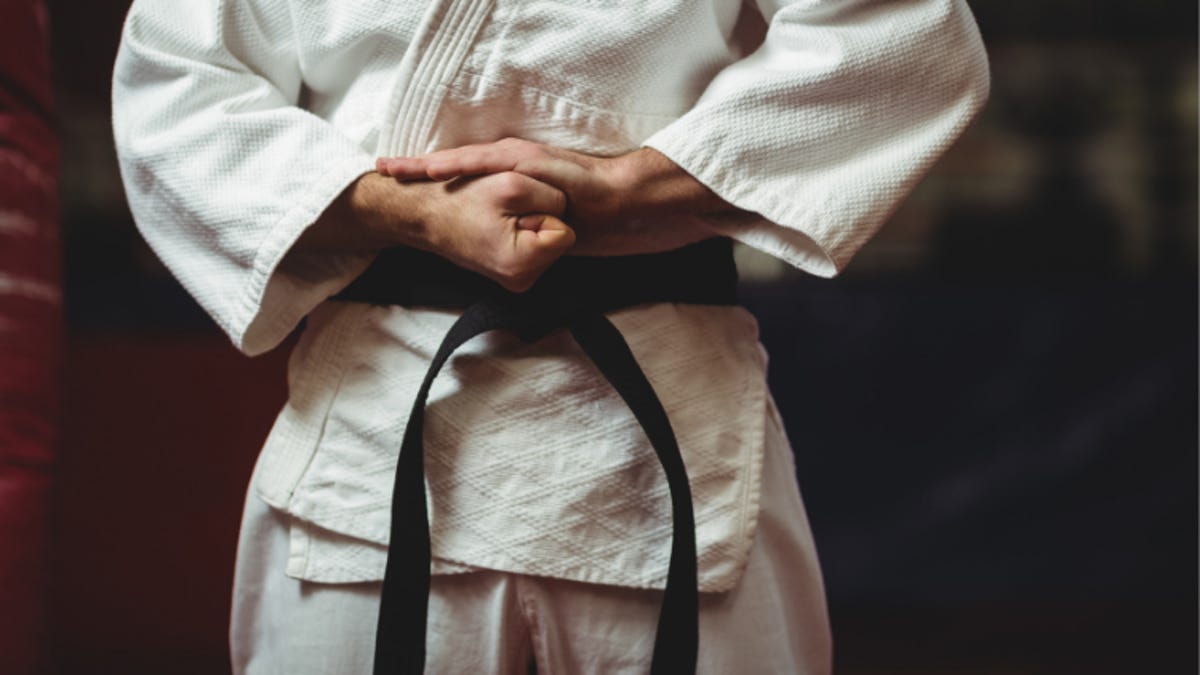Karate at the Tokyo Olympics: What you need to know
A new fan's guide to watching this ancient martial art at the Tokyo Olympics.

Karate's two modalities -- kata and kumite -- make their Olympic debut this year.
If all goes according to plan, it looks like the Tokyo Olympics will finally go ahead this year in July. And Karate will be a part of it.
Karate, a system of unarmed combat that literally means "empty hand," is said to have developed during the 17th century in the Okinawa prefecture, a chain of islands off the southern coast of Japan. Despite being popularized worldwide as a sport after World War II, karate -- along with four other sports -- will be part of the Summer Olympics for the first time at the Tokyo Olympics. Fittingly, it makes its Olympic debut in Japan, where the sport, which involves executing arm- and leg-based strikes, first originated.
It joins judo, taekwondo, and wrestling as the only Olympics-approved martial arts -- for now at least: Karate failed to make the cut for the Paris Olympics in 2024.
With that in mind, here's everything you need to know to enjoy karate during the Tokyo Olympics next summer.
Karate Events at the Tokyo 2020 Summer Olympics
In Tokyo, Karate practitioners, or karatekas, will compete at Nippon Budokan, an indoor legacy venue built to host judo events at the 1964 Tokyo Olympics. Since then, Nippon Budokan, which is located in Kitanomaru Park in the center of Tokyo, has hosted various sports and music acts -- including the Beatles, Led Zeppelin and Diana Ross -- but it's best known as the home of Japanese martial arts. It was the site of the first Karate World Championships in 1970 and to this day still hosts the national championships for judo, kendo, aikido and more.
At the Tokyo Olympics, both the men and the women will compete in two karate events at Nippon Budokan: kata, a solo form discipline, and kumite, a sparring discipline.
Kata
Minh Dack of France competes in the Men's Karate Kata elimination round during the Baku 2015 European Games.
In the Olympics, there will be one kata event -- and one gold medal -- each for men and women. During the competition, karatekas will perform a series of offensive and defensive movements, known as forms, against a virtual opponent. There are 102 kata approved by the World Karate Federation (WKF) that the athletes can choose from, such as Heian Shodan and Nijushiho.
Unlike in traditional competitions, which are scored using a flag system, Olympic judges will use a point system to evaluate the athletes' technical performance, taking things like techniques, timing and breathing into consideration, as well as their athletic performance -- i.e. strength, speed and balance.
According to this new scoring system, an individual's two highest and lowest scores will be thrown out, with the three remaining added together to represent their final score. After a ranking round, top performers will either progress to either the bronze medal or final bout.
Check out the full schedule of the Olympics Karate events.
Kumite
Annika Saelid of Norway (red) and Negin Altooni of Iran (blue) compete in the Women's Kumite +59kg Semifinal during the 2018 Buenos Aires Youth Olympic Games 2018.
The WKF recognizes five weight classes in competition. But in the Olympics, men's and women's kumite will be consolidated into three weight classes. For men those classes are up to 67 kilograms, up to 75kg, and over 75kg, and for women it's and up to 55 kg, up to 61kg and over 61kg.
Within each weight class, pairs of karateka will compete against each other in an 8-by-8-meter area for up to three minutes. Points are awarded when an athlete lands a properly executed strike, kick or punch on various parts of their opponent's body, such as their head, neck, belly or back.
The first karateka to score eight points more than their competitor, or the karateka with the most points at the end of the match is the winner. In the event of a tie, judges determine the winner.
Competitors in each weight class will have to progress through three rounds -- an elimination round, the semi-final, and the final -- in pursuit of a gold medal.
How to watch the Olympics
The Olympics are back on NBC, with a 24/7 stream online if you verify you're a cable subscriber. NBCSports Gold will have a dedicated Olympics package -- pay an upfront fee and you'll be able to watch anywhere, uninterrupted by ads.
Tokyo is 16 hours ahead of the West Coast, so watching live should get a good spread of events. It's a little trickier on the East Coast, where you may have to rely on highlights.
The BBC will cover the games on TV, radio and online in the UK, with more on Eurosport, a pay-TV channel. The time difference there is 8 hours, so you'll have to get up very early in the morning to watch live.
In Australia, the Seven Network will spread free-to-air coverage over Channel Seven, 7Mate and 7Two. It's a good year for watching Down Under, with Sydney only an hour ahead of Tokyo.

